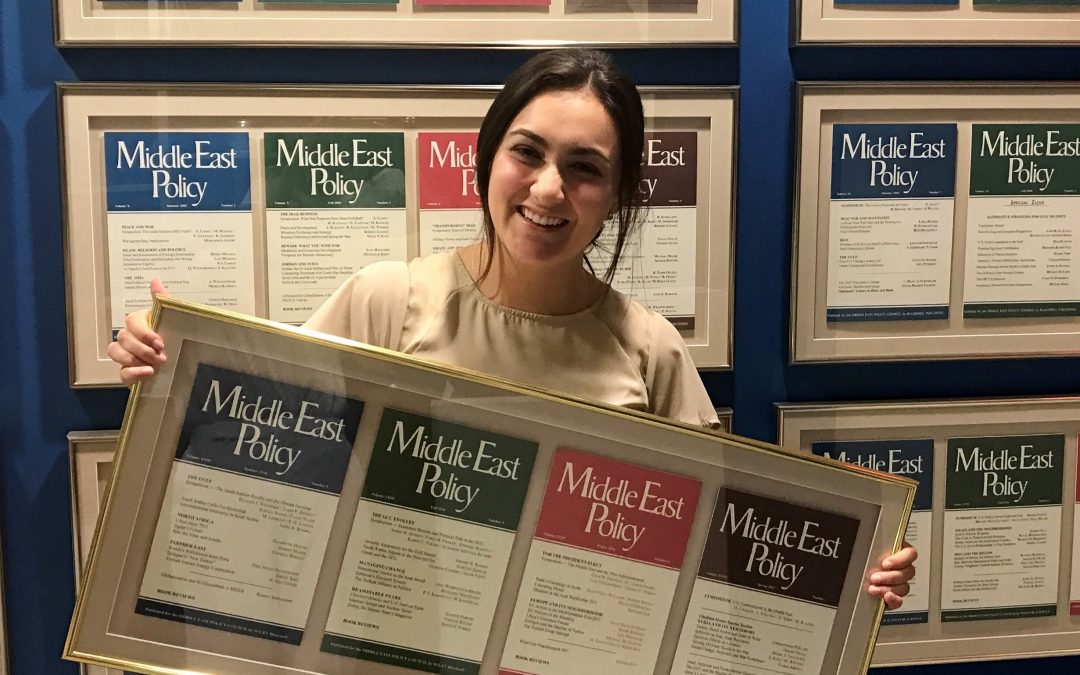
by Madison McHugh | Nov 15, 2017 | Internship Experiences, Undergraduate Students
My name is Gabrielle (Gabi) Hunt, and I’m a rising senior studying Diplomacy, Environmental Studies, and Arabic at Seton Hall. I wanted the organization I interned with this summer to involve work synthesizing all of my interests. Ultimately, I decided on Middle East Policy Council (MEPC) in Washington, D.C., and I could not imagine a better fit.
MEPC is a nonprofit think tank that focuses on education and advocacy work in Middle East issues. It publishes the leading Middle East affairs journal, Middle East Policy (MEP), hosts quarterly Capitol Hill conferences discussing current events, and has an educational outreach branch, TeachMideast, designed to make Middle East issues more accessible to K-12 teachers and students.
I was one of two interns at MEPC who dealt broadly with educational outreach, event coordination, and social media management, along with inputting edits and proofreading articles to be published in MEP. I also wrote a few of my own pieces on current events and completed a 10-week independent project with my fellow intern. For our project, we started a video series aimed at capturing the lives of Arab-Americans around the D.C. metropolitan area. The topics of their interviews typically encompassed how their professions, interests, and passions relate to their cultural identity.
In addition to the larger project, I conducted a series of small projects throughout the weeks – like writing TeachMideast focus pieces – which brought together my interdisciplinary interests. With focus pieces in particular, I was given the opportunity to write about anything I found interesting – from the Saudi Vision 2030 plans to reducing dependency on oil, to the origins of the Boycott, Divestment, and Sanctions movement.
I loved my 10 weeks working at MEPC, especially because I was given so much opportunity to be creative through self-guided projects. Through independent work, I strengthened my professional development and time management skills. I also enjoyed my inclusion in the publication process of MEP, not only because of my interests in writing and editing, but because the responsibility of accurately inputting edits and proofreading fine-tuned my attention to detail and precision. My favorite part about MEPC is that I always felt like a valuable team member whose input was valued.
Overall, I could not be happier with the senior leadership internship experience I had, and the time I was able to spend working in D.C.
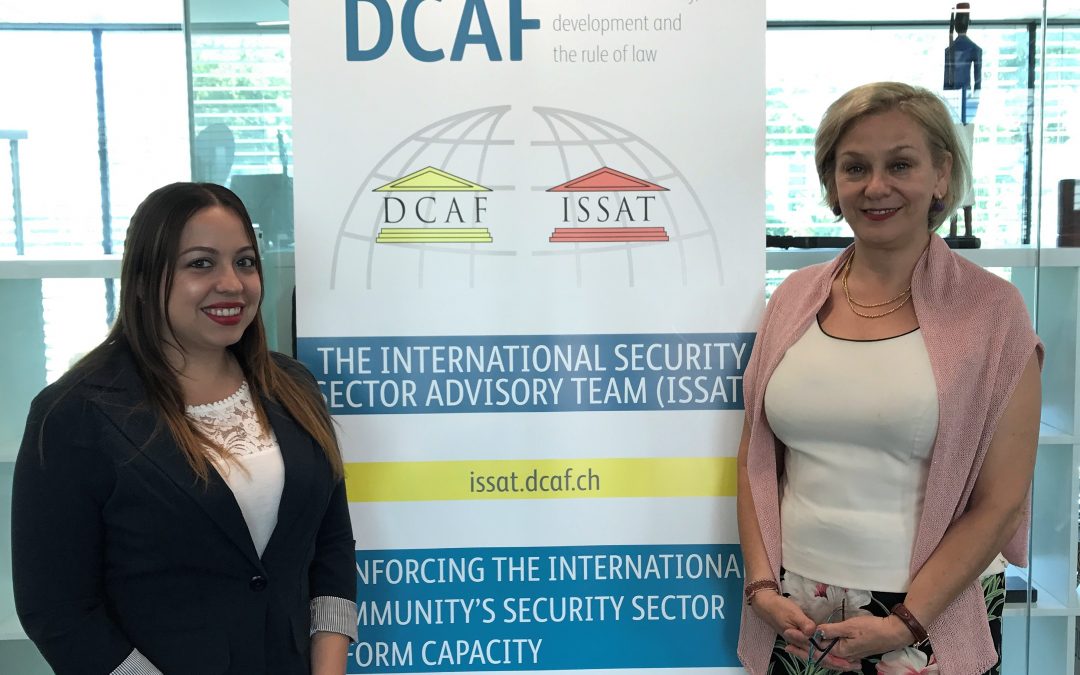
by Madison McHugh | Nov 1, 2017 | Graduate Students, Internship Experiences
My name is Marisela Rivera, and I am a Master of Arts candidate at Seton Hall`s School of Diplomacy and International Relations. Over the summer I had the pleasure of serving as the Sergio Vieira de Mello Fellow for the Geneva Centre for the Democratic Control of Armed Forces (DCAF) in Geneva, Switzerland, the international capital of the world. The fellowship honors a former United Nations Diplomat, Sergio Vieira de Mello, who was killed in the Canal Hotel bombing in Baghdad, Iraq in 2003. Mr. Vieira de Mello is remembered for his long and distinguished career with the UN as well as his efforts to promote peace, human rights and humanitarian aid.
Like Mr. Vieira de Mello, I am passionate about fulfilling peace and security for all. I specialized in two eminent concentrations to promote peace and security: International Law & Human Rights and International Security. My two specializations and my keen interest in Latin America have well prepared me for the fellowship. My host organization, DCAF, is an international foundation that is well-known for its support of security, development, and the rule of law.
Within the DCAF, I worked for the International Security Advisory Team (ISSAT). ISSAT was created to increase the capacity of the international community to support Security Sector Reform (SSR) processes, enhance the effectiveness and quality of SSR programming, and facilitate the coordination and coherence of international assistance for nationally-driven SSR processes. It focuses on four key services: advisory field support, training and capacity development, knowledge services, and advocacy and outreach.
Prior to my arrival, DCAF created a Latin America and Caribbean (LAC) department dedicated to Security Sector Reform. I worked with the director to set the foundation and sustainability flow for this particular department. Together, we created a strategy for LAC, as well as an overview of donors to the region. I utilized my social media and advertising skills to create a memorable LAC webpage, and I wrote country background notes, particularly in Latin American countries. In addition, I was tasked to develop a knowledge product for the Gender and Security section that applied a gender lens to explore the application of local ownership in SSR. The case study analyzed two countries and explore the lessons learned to increase the discussions on Women, Peace, and Security (WPS).
One of the most challenging and gratifying experiences was familiarizing myself with international security and human rights dialect in Spanish. Being of Colombian descent, Spanish is my first language. However, growing up in America and being part of the public education system, Spanish was not a priority. Through DCAF, I learned the importance of bilingualism and the various opportunities that it brings.
Overall, my time with DCAF was insightful and rewarding. I fulfilled many assignments in my area of study, and I was trusted with the duties of a Project Assistant as well as the work of an SSR Officer. My position at ISSAT offered first-hand experience in SSR, specifically in the international security aspect of my career. Given that this is the second year the Sergio Vieira de Mellow Fellowship was offered to a Seton Hall Graduate student, I would highly recommend my fellow peers to apply for this position in the future, and I know I will cherish the knowledge and experience gained with DCAF forever.
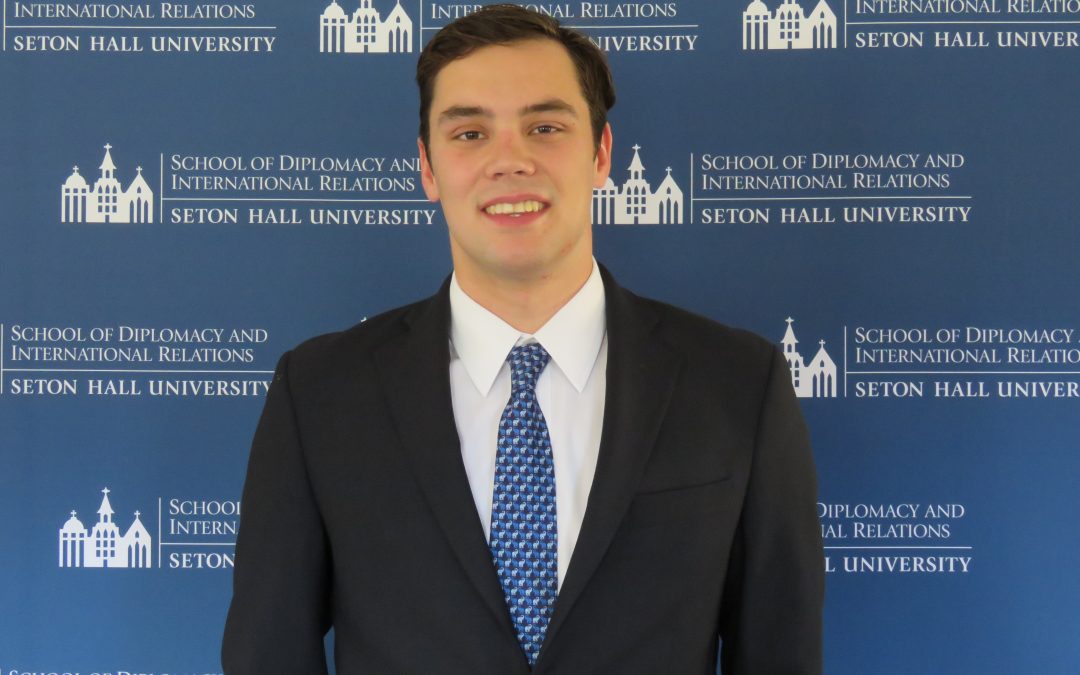
by Madison McHugh | Oct 18, 2017 | Internship Experiences, Undergraduate Students
My name is William Smith, and I am studying Diplomacy and International Relations at Seton Hall. Over the summer, I had the opportunity to intern with Waterfront Development Corporation Limited, a crown corporation tasked with ensuring the prosperity of waterfront areas in my home province of Nova Scotia, Canada. Waterfront areas are extremely important to the coastal area of Nova Scotia, making their prosperity crucial to the success of the province’s tourism industry.
My responsibilities related primarily to the promotion and execution of the corporation’s major summer event, the 2017 RDV Tall Ships Regatta. The regatta is a 7,000-nautical-mile sailing race in which spectacular vessels, known as tall ships, make their way from country to country over the course of the summer. The regatta makes 10 stops in different ports across the province, representing major tourism opportunities for the host ports. The race is heavily promoted as a spectator event as the ships themselves are attractions in their own right. However, there are opportunities to actually sail aboard the majority of the ships visiting as well.
Due to the lack of publicity, I was specifically tasked with creating interest in the sailing opportunities in order to make the event successful as an experiential one as well as a spectating one. To meet the expectations of my tasks, I collaborated with television and newspaper professionals in order to promote the events and sailing opportunities to the general public. I also interacted with some of the crew members of the ships that appear in the regatta who provided me with more information to better promote the experiences that exist. I realized that while television and newspaper promotional activities were beneficial in increasing awareness for the general public, in order to be most effective, I also needed to identify and contact target groups, a task that took up much of my time over the summer.
The opportunity to assist in promoting my home province’s attractions, particularly through a large international event like the Tall Ships Regatta, was extremely rewarding as I recognized the value of bringing the event to fruition for the sake of the province’s success and gained valuable event-planning and management experience.
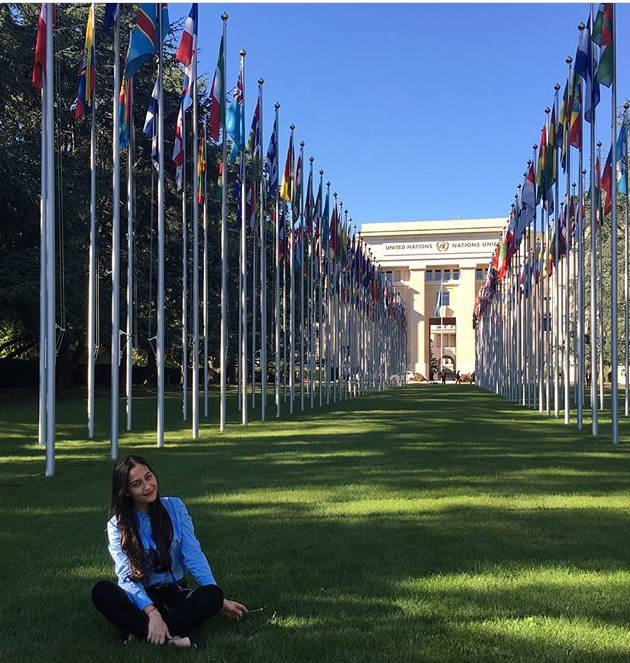
by Madison McHugh | Oct 4, 2017 | Graduate Students, Internship Experiences
My name is Isabel Deluna, and I am a Diplomacy student at Seton Hall. Switzerland was wonderful: being surrounded by multilateral organizations and diplomats from all over the world made my internship at the Dominican Republic Mission to the UN very interesting. Over the summer, a new Ambassador to the Dominican UN was chosen, and I spent much of my time preparing for his arrival by renewing and updating systems and archives.
At the mission, my primary responsibility was to prepare two types of reports for the Minister of Foreign Affairs at the Dominican Republic following UN meetings. We reported verbal notes for the United Nations to notify of activities or requests, as well as “oficio” reports, which were special reports sent to the Dominican Republic to inform the Ministry of Foreign Affairs of mission developments and changes in events or circumstances. I prepared each report with the information provided and entered them into the record system. Everything at the mission must be put on their record, and the reports were vital to fulfilment of the mission. In addition, I frequently assisted during United Nations sessions and meetings with Dominican Republic participants, helping active participants and observers alike.
I believe the internship helped me to build my professional network. I met a great many Ambassadors and diplomats from multiple missions in Geneva who shared their experiences with me and made recommendations on strategies for my future career. I believe it is important to know the missions’ systems as well as how they manage their representation at the United Nations.
I attended sessions that related to a variety of important topics, including migration, human rights, and indigenous groups. The sessions had a great impact on me, because I was able to see the way diplomats interact with each other and express concern and defend certain topics for the benefit of their respective countries. I feel I gained an understanding of their knowledge and strategies, and thus I learned how to think strategically and manage my expression of my opinions. I believe I can apply much of what I learned in future classes and discussions.
Throughout my internship, I gained skills that will help me ascertain my position on topics of importance as well as maintain and defend it, which amplifies my ability to analyse problems and situations on diverse topics. I am very grateful I was given the opportunity to improve my skills in a direct, diplomatic setting, and I would especially recommend the internship to those who are interested in the UN!
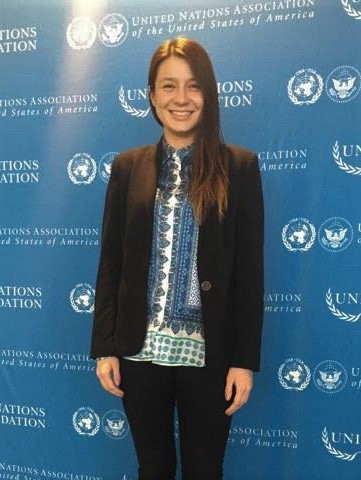
by Madison McHugh | Sep 20, 2017 | Internship Experiences, Undergraduate Students
My name is Daniela Uribe, and I am a senior student of Diplomacy and International Relations from Seton Hall University. I am from Colombia and moved to the United States four years ago to pursue my college education. As part of my learning experience at Seton Hall, I had the chance to intern at the Consulate of Colombia in New Jersey for seven months. The Consulate of Colombia is a government organization that represents and assists its nationals in international territories in order to provide legal assistance, notarize documents, and protect the interest of its citizens.
I decided I wanted to intern at the Colombian Consulate because the country was beginning a new development in its national security since the government’s negotiation and national referendum with the largest terrorist group in the territory, Las FARC. Since the Consulate represents the government of Colombia in the U.S., its role in this development was to organize, educate, and prepare nationals to participate in the referendum. Thanks to this call I was able to start interning at the consulate the week after I applied.
There was a lot of work to be done. As a Consular Intern, I assisted government officials in their consular assignments and assisted nationals with processes such as voting and serving as judges the day of the referendum. In addition, I contacted nationals and spoke effectively about the importance of participating in the referendum, including clarifying inaccurate information. One of the common questions was about viability to vote – whether one fulfulls the requirements set to vote. The National Registry provides ID numbers for nationals to vote in a specific place, and they needed to be informed of the location.
Another large role I played was educating people about the agreement. The agreement was 150 pages, and I needed to know it very well. If I had not studied Diplomacy and International Relations, I would have not been able to understand the type of language the document contained.
Dr. Tinker’s Public International Law course taught me about the importance of language in this type of document; how it could have different interpretations from different parties and how it becomes binding; how much responsibility each party has and the mechanisms of implementation. My class experience prepared me to raise questions and pose concerns during training times and participate in scholarly discussions during the preparation period.
After this experience, I was able to better understand the role and challenges of the consulates and government officials. They cannot advocate for a specific vote, but they must provide all the tools to inform the public to decide freely and support them throughout the process.
I enjoyed every second of the experience. I worked so hard, it felt like a full-time job, but I also learned so much about government and public diplomacy. We also faced challenges, too, during the vote: people showing propaganda, adding extra votes, or voting when they were not registered. It was very interesting being both central to the event and behind-the-scenes.
After the vote, I was selected to help tally the votes and upload the results for New Jersey. It was an honor and privilege to serve my country in this way.
I felt that this was my real job (even while unpaid!) in many ways, but the quality of learning I received from this experience made it so worthy.
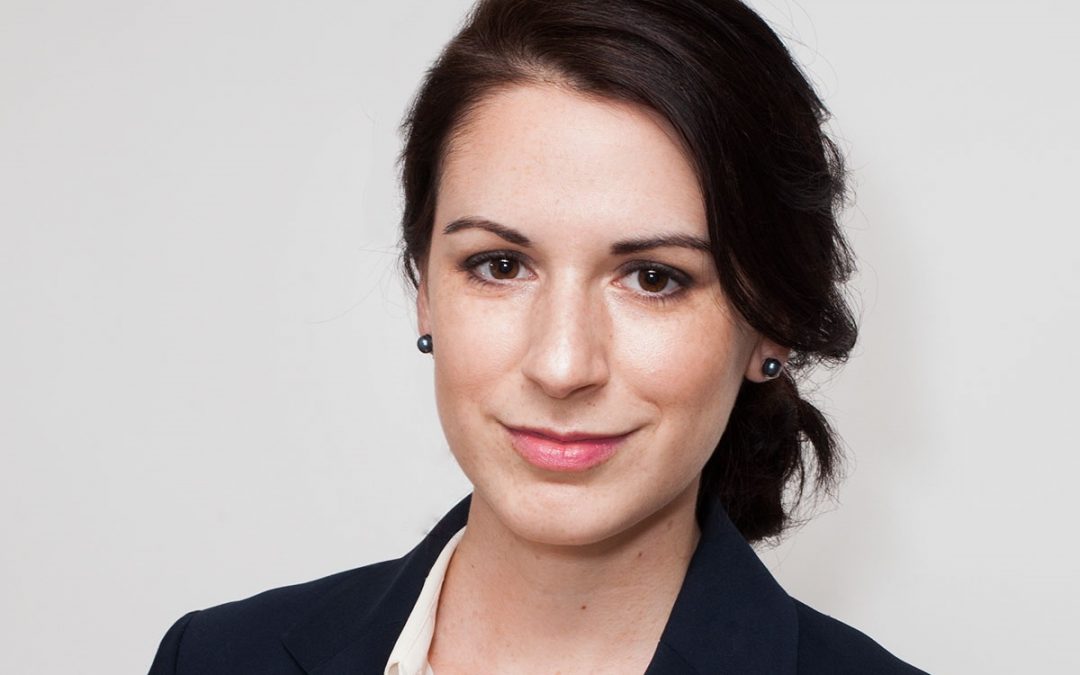
by Catherine Ruby | Jun 6, 2017 | Graduate Students, Internship Experiences
Emily Fox, M.A. May 2017
Carnegie Council on Ethics in International Affairs Internship
This spring, I had the opportunity to intern with the Carnegie Council on Ethics in International Affairs (EIA). I worked for Ethics & International Affairs, a journal publishing articles on current normative and ethical issues in foreign policy and international relations. One of my duties as an Editorial Intern was to act as the first point of assessment for all incoming submissions. In order to succeed at this task, I needed to have not only a strong theoretical background, but also a degree of familiarity with a wide array of current events. Thankfully, the School of Diplomacy has prepared me for these topics.
One of the most prominent debates in international relations ethics regards the policy and principle of the Responsibility to Protect, and many of the submissions I reviewed dealt with this topic. The knowledge I gained at the School’s United Nations Summer Intensive course was incredibly valuable for formulating assessments of these articles. Being able to hear firsthand from experts such as Hugh Dugan and Ed Luck really strengthened my background on the complexity of these issues and the opportunities and constraints the UN must navigate.
My skills in writing and editorial judgement were strengthened considerably by this internship, and I expanded my knowledge of international affairs by reading articles and essays by scholars. I learned a great deal about publishing and the peer-review process, and am able to participate and contribute in high-level meetings. Though I was lucky to have several years of professional experience prior to being hired at EIA, I have found that each professional environment teaches me something new about organization, communication, and workflow.
Should I choose to pursue a career as an editor, I will be prepared as my internship with EIA taught me a great deal about the requirements and challenges in the field, and has shown me the best practices for working through different stages of publication. As an intern, I often juggled several projects at once. My team at EIA was ready to provide guidance on prioritization and organization, which allowed me to complete my tasks efficiently without sacrificing quality.
The assignment I was most excited to complete at EIA was my book review. Each intern is invited to contribute a short review of a book of their choice for publication online and in the print journal. Because I could choose my book, I was able to pick something in an area in which I am interested. Not only was I able to read a book that interested me, but I also gained valuable writing experience from the exercise.
During my time at the internship, I tried to incorporate feedback whenever possible and volunteered for additional work when able. While I still have many opportunities for improvement, I think that applying these principles helped me to be successful thus far.
I would highly recommend my internship to others. The Carnegie Council is an excellent institution and a great place to be connected to. My coworkers have made me feel like a true member of the team, and their advice and guidance has been incredibly helpful for my professional development.
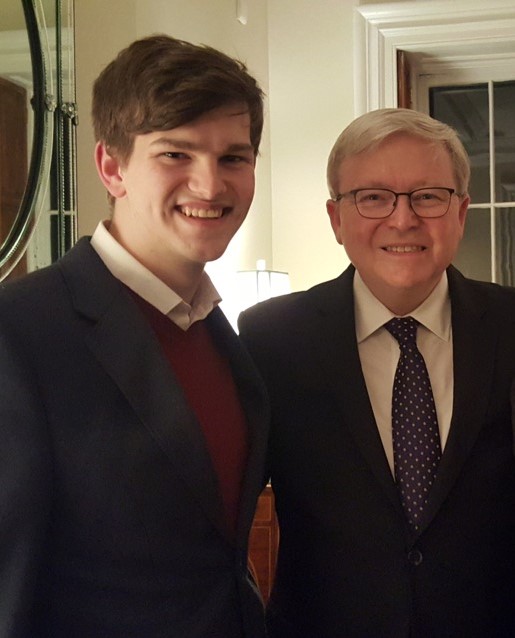
by Thomas Ashe | Feb 6, 2017 | Graduate Students, Internship Experiences
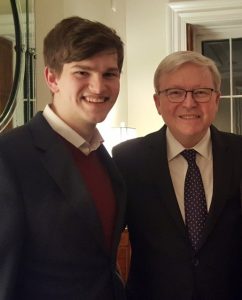
My name is Kevin Princic. I worked as an intern at the Asia Society Policy Institute in New York City. At Seton Hall University I am a second year graduate student pursuing a Master of Arts Degree in Diplomacy and International Relations with specializations in Foreign Policy Analysis as well as Global Negotiation and Conflict Management.
When applying to attend Seton Hall University’s School of Diplomacy and International Relations, I decided that one of the main goals of my graduate studies would be to branch out in my region of interest, Asia. I have studied Japan and China quite extensively; however, my knowledge of the rest of Asia was quite limited in comparison. With this goal in mind, I began my studies at Seton Hall but little did I know that my ambitions would lead me to an internship of a lifetime. At the School of Diplomacy and International Relations’ orientation, I first heard about the Asia Society from a colleague. She raved about her experience and encouraged me to apply for a position. This summer I took the plunge and applied to the Policy Institute and was so fortunate to receive an internship offer for the fall semester.
My work at the Asia Society Policy Institute has been instrumental in achieving my goal of becoming a well-rounded Asia scholar. One of the core responsibilities for interns with the Policy Institute is to conduct a press scan every day. Every Monday I began my day with a cup of coffee and several dozen news stories spanning all across Asia. It was duty to isolate the relevant stories, summarize them, and compile a list separated by sub-region. The final press scan usually contained around thirty different news articles. This task alone was instrumental in achieving my goal. Although I only completed the press scan on Mondays, I received it every day of the week from the other interns as well. This is just one of many instances in which the Asia Society is a full immersion learning experience.
I found that on more than one occasion that my work in the classroom at Seton Hall relates directly to my work at the Asia Society Policy Institute. For example, I was tasked with preparing a brief on North Korea’s nuclear programs and finding any related data. From my personal research I knew that this type of information was scarce due to North Korea’s isolationist nature. However, my relentless search proved fruitful for both myself and the Asia Society. The data I found helped me make progress on formulating my research design which will eventually become my Master’s Research Project and allowed me to provide a thorough brief to the Policy Institute. This is just one of many instances in which my work at the Asia Society and at Seton Hall intermingled.
The Asia Society Policy Institute is a think/do tank which makes it a little different from the typical think tank. My favorite aspect of the Policy Institute is its hands on approach to policy challenges in Asia. The Asia Society is also well known for its programming, bringing in prominent guests to speak on their research or practice. I was lucky enough to be working at the Asia Society as it held its United Nations General Assembly event series. During this series I assisted with events on topics ranging from North Korea’s nuclear program featuring both scholars and policy practitioners, to a dialogue on the Association of Southeast Asia Nations (ASEAN) 50th anniversary featuring delegates from several ASEAN states. The Asia Society even hosted the leader of Myanmar, Aung San Suu Kyi, who spoke on her efforts to democratize the country and reopen it to the world. Learning from these influential people through these events has been a truly unique and enlightening experience.
My experience at the Asia Society made me feel as though I am a part of something bigger that is having an impact in not only the United States, but also in Asia and even throughout the entire world.
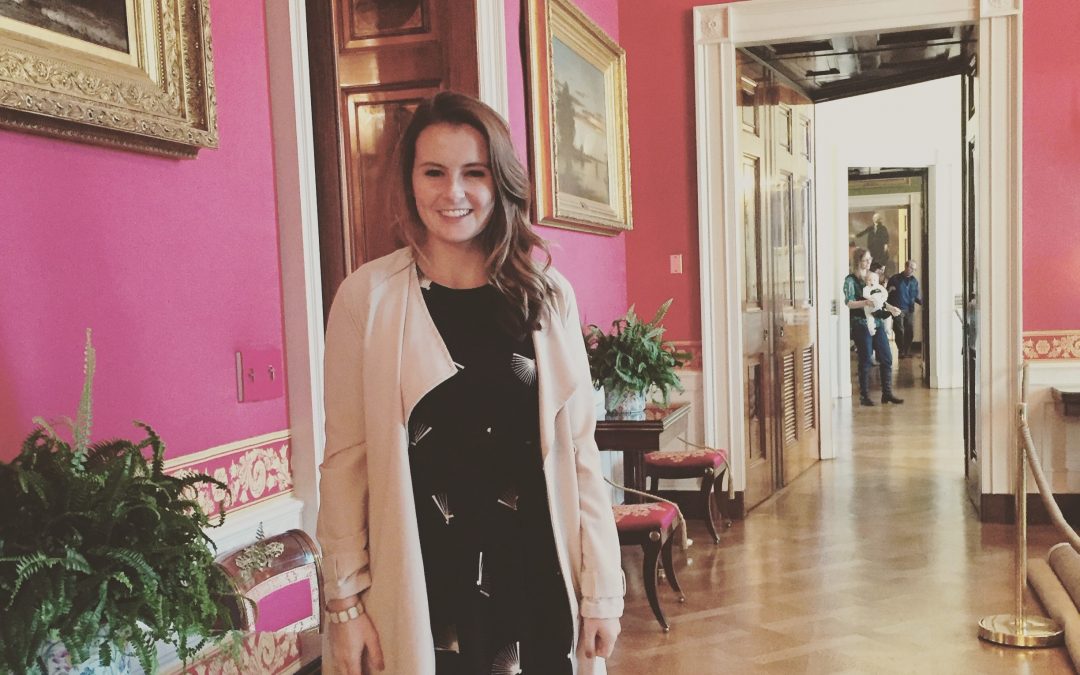
by Thomas Ashe | Feb 6, 2017 | Internship Experiences, Undergraduate Students
My name is Courtney Boland. My experience living and working in Washington D.C. was an eye-opening experience. At the United States Agency for International Development (USAID), I participated in projects that extended throughout the world, all with the overarching goal of ending extreme poverty and promoting resilient societies. In the Bureau of Legislative and Public Affairs, I worked with several different departments and witnessed the wide range of agency operations.
Right from the beginning, I dove right in to support the agency’s work at the United Nations General Assembly (UNGA). I worked previously at the UNGA during my time as an intern at the British Consulate General in New York City so I was able to smoothly transition into my new role. Furthermore, when Hurricane Matthews devastated the Caribbean, specifically Haiti, I had the opportunity to see how USAID responded to natural disasters and humanitarian crises. This was a particularly enormous task for the Public Affairs team. All the staff members, including myself, had to ensure accurate information was disseminated out to the public and to USAID’s mission in Haiti as quickly as possible. I gained first-hand experience in the preparation and “war-room “style of operations for disasters.
While all the work I contributed to at USAID has been exciting, the most rewarding was working for First Lady Michelle Obama’s Let Girls Learn initiative. I always admired her global campaign to bring education to 62 million girls who are currently not enrolled in school. The experience to support that mission was certainly very surreal. I tailored my academic studies to gender equality and the importance of female education, which served as key issues of interest for USAID. I assisted in strategic communications for the premiere of The First Lady’s CNN documentary “We Will Rise,” which focused on her trip to Liberia and Morocco where she met with Let Girls Learn beneficiaries. I also visited the White House with my supervisor to meet with our FLOTUS Office counterparts and was even given the opportunity to have a tour of the White House — a D.C. dream come true.
Working for the U.S. government provided me with the opportunity to learn more about the inner-operations of the federal government. Additionally, I witnessed how government agencies prepare for transition from one administration to another. I did not realize how intensive it is and how many people actually leave the agency once President Obama’s administration comes to an end. This is important for me to experience especially if I plan to work in the U.S. government again one day. This experience made it ever more clear to me that I want to continue to work in Washington D.C. following graduation in May.
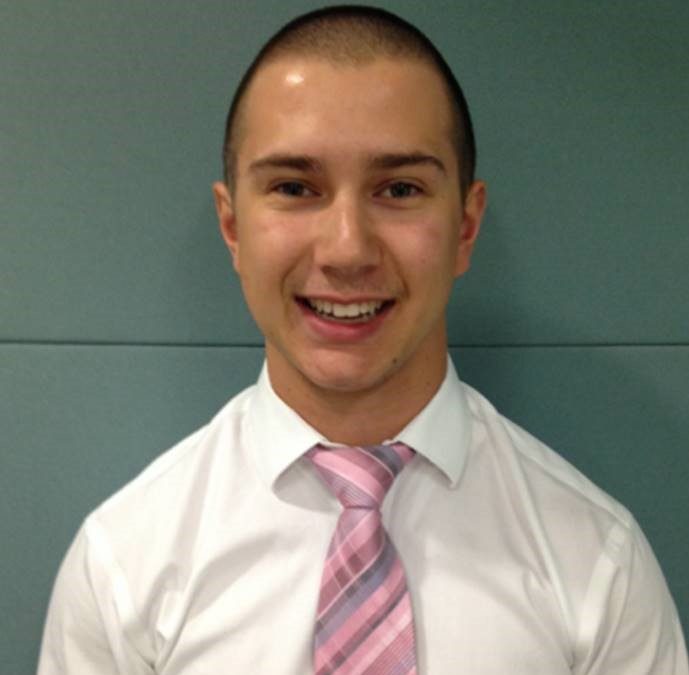
by Thomas Ashe | Feb 6, 2017 | Internship Experiences, Undergraduate Students
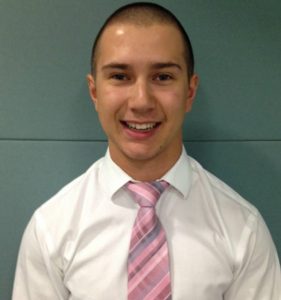 My name is Andrew Cameron and I am a senior Diplomacy and International Relations major. This past fall I interned at the Council on Foreign Relations (CFR) in New York City. My work at the CFR was a very educational experience that provided me with some amazing opportunities. The second week into my internship notably coincided with the annual United Nations General Assembly (UNGA) meetings! This was one of the busiest weeks for the Council due to the large number of heads of state, scholars, and diplomats who travel into the city.
My name is Andrew Cameron and I am a senior Diplomacy and International Relations major. This past fall I interned at the Council on Foreign Relations (CFR) in New York City. My work at the CFR was a very educational experience that provided me with some amazing opportunities. The second week into my internship notably coincided with the annual United Nations General Assembly (UNGA) meetings! This was one of the busiest weeks for the Council due to the large number of heads of state, scholars, and diplomats who travel into the city.
At CFR, I worked in the Corporate Department. Notably, CFR is far more than an organization that publishes Foreign Affairs magazine. With an elite corporate member base, my department regularly conducts events of varying sizes. Events range from conference calls where experts and senior executives weigh in from their offices worldwide, to large speaker seminars held at our Washington D.C. or New York office. The corporate department’s main function is to serve our members and educate them on international events. Proposed legislation, armed conflicts, and many other topics can be very pertinent to decisions companies make as they engage in global trade and commerce.
My position essentially comprised of two main job functions. The first area was logistics and event staffing. I had the opportunity to staff some very exciting events that included speakers such as then-Vice President Joe Biden to New Zealand Prime Minister John Key. For the most part I worked check in at the events, and I was then able to sit in on the meetings and work microphones during question and answer sessions. Given exposure to these very influential figures and having heard their ideas provided me with several exciting opportunities. To me this has definitely been the highlight of my position. Just as exciting was experience firsthand how the topics I have researched in my academic classes actually are discussed by high level executives and civil servants. For example, the New Zealand Prime Minister spoke to CFR about the Trans-Pacific Partnership, a trade agreement I wrote numerous papers on and discussed in many classes. Seeing how relevant my education is, and having the background knowledge to understand and analyze the statements made during these sessions is an extremely interesting and rewarding experience.
I definitely enjoyed my time at the Council on Foreign Relations. Getting a taste of the real world was an exciting adventure.
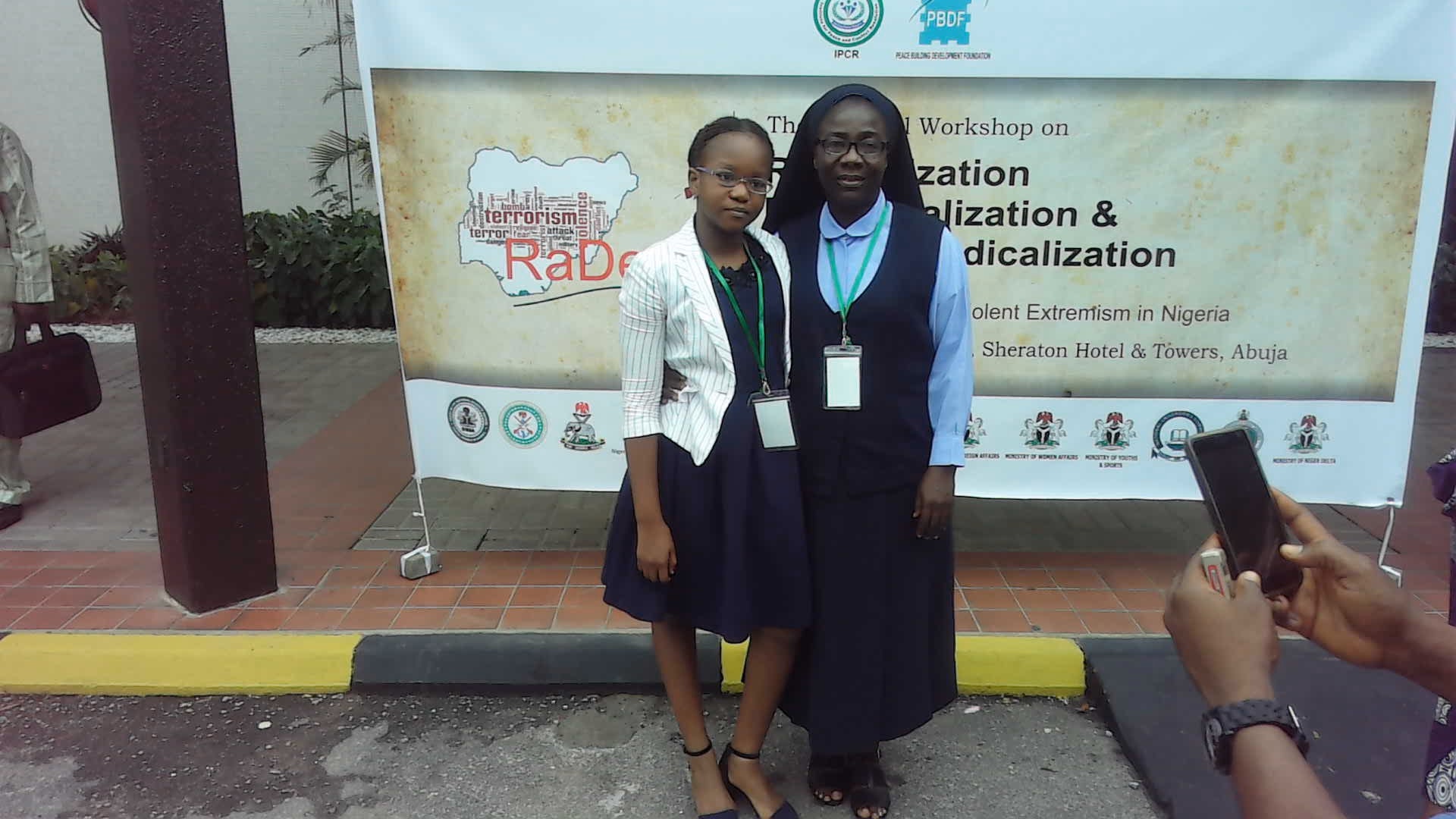
by Catherine Ruby | Nov 1, 2016 | Graduate Students, Internship Experiences
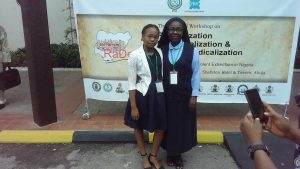
My name is Sister Mary John Bosco Ebere Amakwe and I am a graduate student at the School of Diplomacy and International Relations. I interned at The Institute for Peace and Conflict Resolution (IPCR) in Nigeria – at the Directorate of Internal Conflict Prevention and Resolution as a research assistant. This Institute was founded in 2000 under the Ministry of Foreign Affairs primarily as a research center, think-tank, and agency to strengthen Nigeria’s capacity for the promotion of peace and conflict prevention.
I chose to intern at this Institute because I was born and raised in Nigeria, a complex country where conflict is part of everyday life. I believe something has to be done because there is an urgent need for reconciliation and reconstruction of this great nation known as the “Giant of Africa.” and I want to be part of rebuilding efforts. Ultimately, I want to become a conflict mediator and my internship experience has absolutely solidified that passion to become one.
One of my very first assignments at the institute was to accompany a delegation which included the Director General of the Institute to the Embassy of Hungary that houses the United Nations High Commission for Refugee Agency (UNHCR) in Nigeria. The reason for the visit was to sign a Memorandum of Understanding (MoU) between the Institute and UNHCR. This signing is very important according to the UN Higher Commissioner for Nigeria and the Director General of IPCR because it is a way to formalize the partnership between the two bodies in their effort to further peace building efforts in Nigeria. UNHCR and IPCR also work together with different stakeholders in the country in revamping peace and taking preventive measures to stop conflict so that there will not be refugees and internally displaced people in the country. This is done by creating policy frameworks like personnel building, networking, and the implementation of all initiatives that will bring about conflict prevention and will lead to lasting peace in Nigeria. On July 11, 2016 there was another signing of a Memorandum of Understanding (MoU) between IPCR and Treasure Hunts – an NGO for peace and development in Nigeria which uses artwork, drama, plays, etc. for peace building. This experience fascinated me because it validated what I learned in the classroom and connected my course work as strategies for peacebuilding.
Finally, my internship offered me opportunities for networking. For instance, I had several conversations with Mrs. Paulette Dadey, the UN High Commissioner for Refugees in Nigeria; Mrs. Elizbeth Ekaete, the CEO of Emmanuel Royal Foundation for peacebuilding in families; Dr. Aliyu Ahmed-Hameed, principal consultant for Cardston Consulting Agency on peace research, policy and strategy; Dr. Marane Ngoulla, CEO of TOGUNA (the place of dialogue for peace) Foundation for peace and development. My last visit was with the Coordinator for the African First Ladies Peace Mission; and a member of the Nigerian House of Representatives. We discussed her role as a woman legislator representing her constituency in the House.














